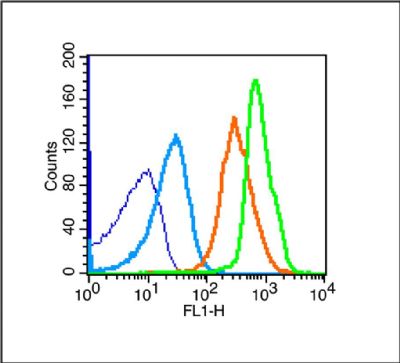产品货号 : mlR7696
英文名称 : AXUD1
中文名称 : 转化生长因子β诱导蛋白3抗体(半胱氨酸和丝氨酸富含核蛋白1)
别 名 : Axin 1 Up-regulated; Axin-1 up-regulated gene 1 protein; CSRN1_HUMAN; CSRNP-1; CSRNP1; Cysteine/serine-rich nuclear protein 1; DKFZp566F164; FAM130B; Protein URAX1; TAIP 3; TAIP-3; TGF beta induced apoptosis protein 3; TGF-beta-induced apoptosis protein 3; URAX1.
研究领域 : 细胞生物 信号转导 细胞周期蛋白 转录调节因子 表观遗传学
抗体来源 : Rabbit
克隆类型 : Polyclonal
交叉反应 : Human, Mouse, Rat, Pig, Cow, Rabbit, Sheep,
产品应用 : ELISA=1:500-1000 IHC-P=1:400-800 IHC-F=1:400-800 Flow-Cyt=1ug/Test IF=1:100-500 (石蜡切片需做抗原修复)
not yet tested in other applications.
optimal dilutions/concentrations should be determined by the end user.
分 子 量 : 64kDa
细胞定位 : 细胞核
性 状 : Lyophilized or Liquid
浓 度 : 1mg/ml
免 疫 原 : KLH conjugated synthetic peptide derived from human AXUD1:201-300/589
亚 型 : IgG
纯化方法 : affinity purified by Protein A
储 存 液 : 0.01M TBS(pH7.4) with 1% BSA, 0.03% Proclin300 and 50% Glycerol.
保存条件 : Store at -20 °C for one year. Avoid repeated freeze/thaw cycles. The lyophilized antibody is stable at room temperature for at least one month and for greater than a year when kept at -20°C. When reconstituted in sterile pH 7.4 0.01M PBS or diluent of antibody the antibody is stable for at least two weeks at 2-4 °C.
PubMed : PubMed
产品介绍 : This gene encodes a protein that localizes to the nucleus and expression of this gene is induced in response to elevated levels of axin. The Wnt signalling pathway, which is negatively regulated by axin, is important in axis formation in early development and impaired regulation of this signalling pathway is often involved in tumors. A decreased level of expression of this gene in tumors compared to the level of expression in their corresponding normal tissues suggests that this gene product has a tumor suppressor function. [provided by RefSeq, Jul 2008].
Function:
Binds to the consensus sequence 5'-AGAGTG-3' and has transcriptional activator activity. May have a tumor-suppressor function. May play a role in apoptosis.
Subcellular Location:
Nucleus
Tissue Specificity:
Ubiquitous. Most abundantly expressed in lung, placenta, skeletal muscle, pancreas and leukocyte. Frequently down-regulated in lung, kidney, liver and colon cancers compared with their corresponding normal tissues.
Similarity:
Belongs to the AXUD1 family.
SWISS:
Q96S65
Gene ID:
64651
Important Note:
This product as supplied is intended for research use only, not for use in human, therapeutic or diagnostic applications.
产品图片












